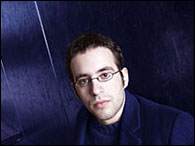Kaleidoscope
David Nachfolger: Linking cultures, healing wounds
 PHOTO: Claudio Calligaris
PHOTO: Claudio Calligaris |
|
In some ways, David Nachfolger's summer job was like many others -- get the mail, sort the mail, repeat. Except unlike many Canadian students making a few bucks over the summer, he was in Geneva. And the mail he was dealing with was extraordinary -- tales of heartbreak and loss from the defining event of the last century.
In the decades since the end of the Second World War the government of Germany established a number of programs designed to compensate victims of the Nazi regime. Funds were established for Eastern European, Jewish, Roma and French victims, among others. Nachfolger was a legal intern for one of the newer funds.
"It was strictly for commercial property -- people who lost businesses, people who lost factories, people who lost any type of productive commercial asset during the war," explained Nachfolger.
The commercial property compensation program was run in Geneva by the International Organization for Migration (IOM), as a component of the Forced Labour Compensation Fund.
"It was seen as a smaller program -- they were only expecting about 5,000 claims," he said. The Forced Labour Fund received 300,000 claims, while the commercial property fund received 14,000.
In Geneva, his larger problem was processing claims submitted in Hebrew. The computers in his office were set up for Latin and Cyrillic alphabets. Hebrew uses a different system, meaning Nachfolger had to process thousands of documents in a system of his own devising.
In addition, he had to compose and respond to hundreds of letters sent to the IOM in Hebrew.
"These were lawyers' letters so it would take me days sitting with a dictionary to write them, and there was no one to proofread them," he said.
Nachfolger explained that for the most part, the legal interns were not able to process "positive" claims -- there was no criteria for most of his time there. Instead, they spent most of their time dealing with "negative" claims -- those that were inappropriate for the fund, or lacked enough documentary evidence.
"Some of them were very sad -- there were lots of people claiming for the wrong things, like suffering. So you'd get family photos with everyone's face crossed out except for one, who was the only survivor. You'd get a file that was anonymous in every way -- it was like a paper factory really -- and then you'd get that photo or something that would stick out that would make that personal connection.
"I think for a lot of people it was draining, but I had worked in the field of Holocaust education for so many years that I was better able to deal with it."
So how does a Montreal born-and-bred law student get to Geneva?
Nachfolger's resume was ideal for the job. The program required law interns who were fluent in English and French (the working languages of the IOM), German (the language of most of the historical documentation) and the language in which the claim was made. Nachfolger has the legal training, English and French, and grade school Hebrew as well as being fluent in German.
This latter ability he picked up while working at the Montreal Holocaust Centre. While there, he made friends with Austrian students who were participating in the "Gedenkdienst" (commemoration) program that Austrian youth could participate in as an alternative to military service. It was often difficult for them.
"They were coming from an environment where they had never had interactions with the Jewish community before, and suddenly were in a Holocaust museum in a Holocaust centre in a Jewish community," said Nachfolger. He became the unofficial liaison for the program in Montreal, and became friends with several of the volunteers. His friendship with them, and his subsequent trips to Austria and Germany led to him learning the language, and better understanding their culture -- a culture that many in the Jewish community are still extremely uncomfortable dealing with.
The young law student's open mindedness and curiosity about other cultures will serve him well. After Nachfolger graduates in 2004, he hopes to continue working in international law.
"I find areas where there's a lot of tension, a lot of hostility, and throw myself into it. I want to see why, and learn what both sides have to say."
Mark Reynolds
 |
||||
|
Hip-hop is everywhere at the moment... And this is the moment, traditionally, when trends die. In a sense, it's like it's going nova: like the stars that explode before they die. |
||||
Rock-a-bye chipmunk...
 |
|
So you thought you were hungover after New Year's? As many of us recover from the effects of excessive holiday cheer, spare a thought for the chipmunk. For the past three months, chipmunks have been hiding about one metre beneath our very feet in a deep form of hibernation called torpor. Sounds good -- who hasn't thought of climbing into bed and sleeping away the winter? But recent research by scientists from McGill and the University of Sherbrooke suggests that torpor is more of a nightmare than a pleasant dream. The hangover that follows a six-month torpor is far worse than that following an overindulgence in Christmas eggnog.
Torpor is a coma-like state that involves a severe reduction in both body temperature and metabolism. By reducing metabolism, torpor reduces the energy demands of chipmunks by more than 75%. In this state, the food can last much longer, and chipmunks can emerge in spring with energy to spare for the much-anticipated mating event.
"But there are serious risks involved." explained natural resource sciences professor Murray Humphries, principal author of the study.
Chipmunks fall into a near brain-dead state where their body temperature drops to within a few degrees of freezing. Heart rate plummets from a 400 beat per minute drum roll, to a 23 beat per minute crawl. Basic body functions are shut down, resulting in a dangerous build up of toxins. Brain activity is arrested to such a degree that chipmunks lose their ability to sleep. "It is hard to conceive of a sleep so deep that it no longer involves sleep," mused Humphries. Sleep deprivation may be why chipmunks rouse periodically from bouts of torpor -- they literally have to wake to sleep. And when they finally rouse, they often experience temporary brain damage, disorientation and memory loss that may take days to recover from.
When the researchers provided chipmunks with an unlimited supply of food, they found that chipmunks prefer to reduce their use of torpor. Unlimited food supplies are unlikely to happen. So despite the obvious dangers of torpor, it is often the only option for winter survival.
Ian Popple
Ian Popple is a student writer in McGill's SPARK (Students Promoting Awareness of Research Knowledge) program, funded by NSERC. Longer versions of this article have appeared in The Globe and Mail and The Gazette.
 |
||||
|
As they drift upwards, you're eliminating people who could be very good students.... And that's not a comfortable position to be in. |
||||

